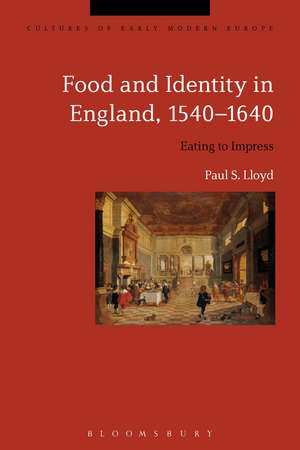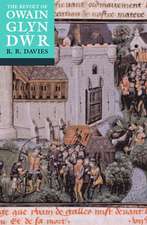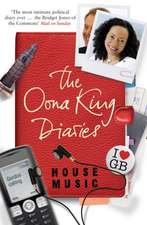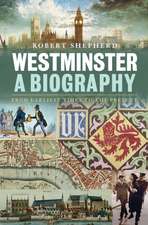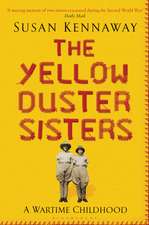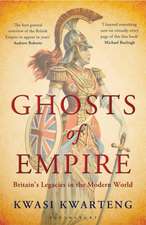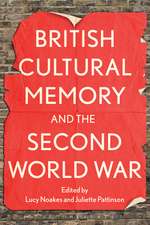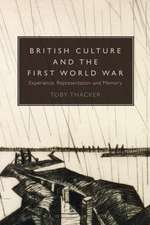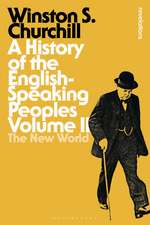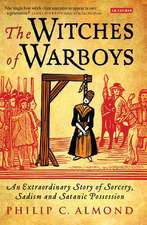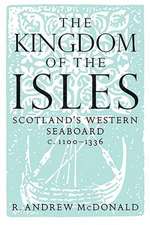Food and Identity in England, 1540-1640: Eating to Impress: Cultures of Early Modern Europe
Autor Dr Paul S. Lloyd Beat Kümin, Professor Brian Cowanen Limba Engleză Paperback – 24 aug 2016
| Toate formatele și edițiile | Preț | Express |
|---|---|---|
| Paperback (1) | 257.59 lei 6-8 săpt. | |
| Bloomsbury Publishing – 24 aug 2016 | 257.59 lei 6-8 săpt. | |
| Hardback (1) | 774.20 lei 6-8 săpt. | |
| Bloomsbury Publishing – 25 feb 2015 | 774.20 lei 6-8 săpt. |
Preț: 257.59 lei
Preț vechi: 331.22 lei
-22% Nou
Puncte Express: 386
Preț estimativ în valută:
49.31€ • 53.57$ • 41.44£
49.31€ • 53.57$ • 41.44£
Carte tipărită la comandă
Livrare economică 21 aprilie-05 mai
Preluare comenzi: 021 569.72.76
Specificații
ISBN-13: 9781350002043
ISBN-10: 1350002046
Pagini: 264
Dimensiuni: 156 x 234 x 21 mm
Greutate: 0.37 kg
Ediția:NIPPOD
Editura: Bloomsbury Publishing
Colecția Bloomsbury Academic
Seria Cultures of Early Modern Europe
Locul publicării:London, United Kingdom
ISBN-10: 1350002046
Pagini: 264
Dimensiuni: 156 x 234 x 21 mm
Greutate: 0.37 kg
Ediția:NIPPOD
Editura: Bloomsbury Publishing
Colecția Bloomsbury Academic
Seria Cultures of Early Modern Europe
Locul publicării:London, United Kingdom
Caracteristici
First book linking consumption patterns in early modern England with social class and cultural identity
Notă biografică
Paul S. Lloyd is University Tutor and Part-time Lecturer at the University of Leicester, UK.
Cuprins
PART ONEIntroductionChapter 1: Food and IdentityPART TWOChapter 2: The meaner sort and their dietsChapter 3: The middling sort and their dietChapter 4: The diet of the gentryPART THREEChapter 5: Special Foods and Their Preparation Chapter 6: Sociability - Gift-Foods and Special OccasionsConclusionBibliographyIndex
Recenzii
Lloyd's work uses interesting sources to tell an important story about food in England in the late sixteenth and early seventeenth centuries . The tale told in this volume will be of interest to those seeking to understand the meaning that clings to food and to those seeking a greater understanding of the Tudor and Stuart period of English History.
Dr Lloyd has produced a fascinating study, rich in historical context.
This extremely well-researched book, written in wonderfully clear prose, is part of Bloomsbury's 'Cultures of Early Modern Europe' series ... [It] provides a wealth of fascinating information.
Making rigorous use of a wide range of source material-from household accounts and records of public institutions, through diaries and correspondence, and onto cookery books and regimen guides-Paul Lloyd vividly reconstructs the increasingly differentiated eating habits of various 'sorts' of people in early modern England. Paying particular attention to the cultural impact of the Reformation on long-established patterns of consumption, Food and Identity in England examines the changing ways in which various groups within the population expressed their social and cultural self-image through their foodways. The result is a convincing portrait of how and why attitudes towards food changed between the mid-sixteenth and mid-seventeenth centuries, with profound implications not only for habits of sociability and commensality but also for the construction of collective social identities.
Lloyd presents a careful, well researched, well thought out, and very well written analysis of the relationship between food and people in early modern England, utilizing recent research on food and society. He deftly shows the connection between food and social classes in England . The author's very clear writing style makes his book well suited for undergraduates and should stoke their imaginations by introducing creative and innovative ways to do research and look at sources in a fresh manner. At the same time, the book contains very sophisticated research and historical methods that would challenge any graduate student working on early modern England. Summing Up: Highly recommended. All levels/libraries.
Dr Lloyd has produced a fascinating study, rich in historical context.
This extremely well-researched book, written in wonderfully clear prose, is part of Bloomsbury's 'Cultures of Early Modern Europe' series ... [It] provides a wealth of fascinating information.
Making rigorous use of a wide range of source material-from household accounts and records of public institutions, through diaries and correspondence, and onto cookery books and regimen guides-Paul Lloyd vividly reconstructs the increasingly differentiated eating habits of various 'sorts' of people in early modern England. Paying particular attention to the cultural impact of the Reformation on long-established patterns of consumption, Food and Identity in England examines the changing ways in which various groups within the population expressed their social and cultural self-image through their foodways. The result is a convincing portrait of how and why attitudes towards food changed between the mid-sixteenth and mid-seventeenth centuries, with profound implications not only for habits of sociability and commensality but also for the construction of collective social identities.
Lloyd presents a careful, well researched, well thought out, and very well written analysis of the relationship between food and people in early modern England, utilizing recent research on food and society. He deftly shows the connection between food and social classes in England . The author's very clear writing style makes his book well suited for undergraduates and should stoke their imaginations by introducing creative and innovative ways to do research and look at sources in a fresh manner. At the same time, the book contains very sophisticated research and historical methods that would challenge any graduate student working on early modern England. Summing Up: Highly recommended. All levels/libraries.
